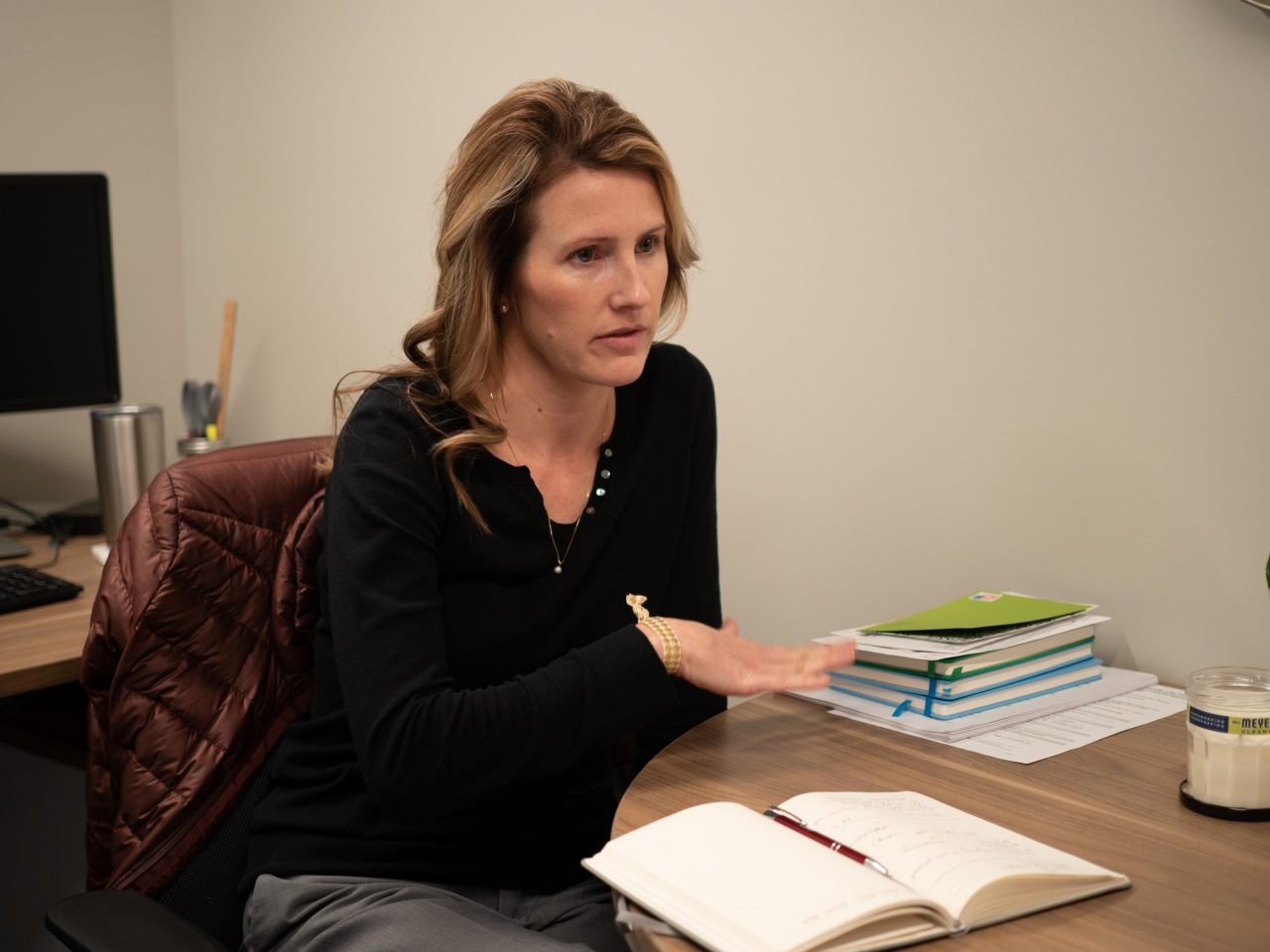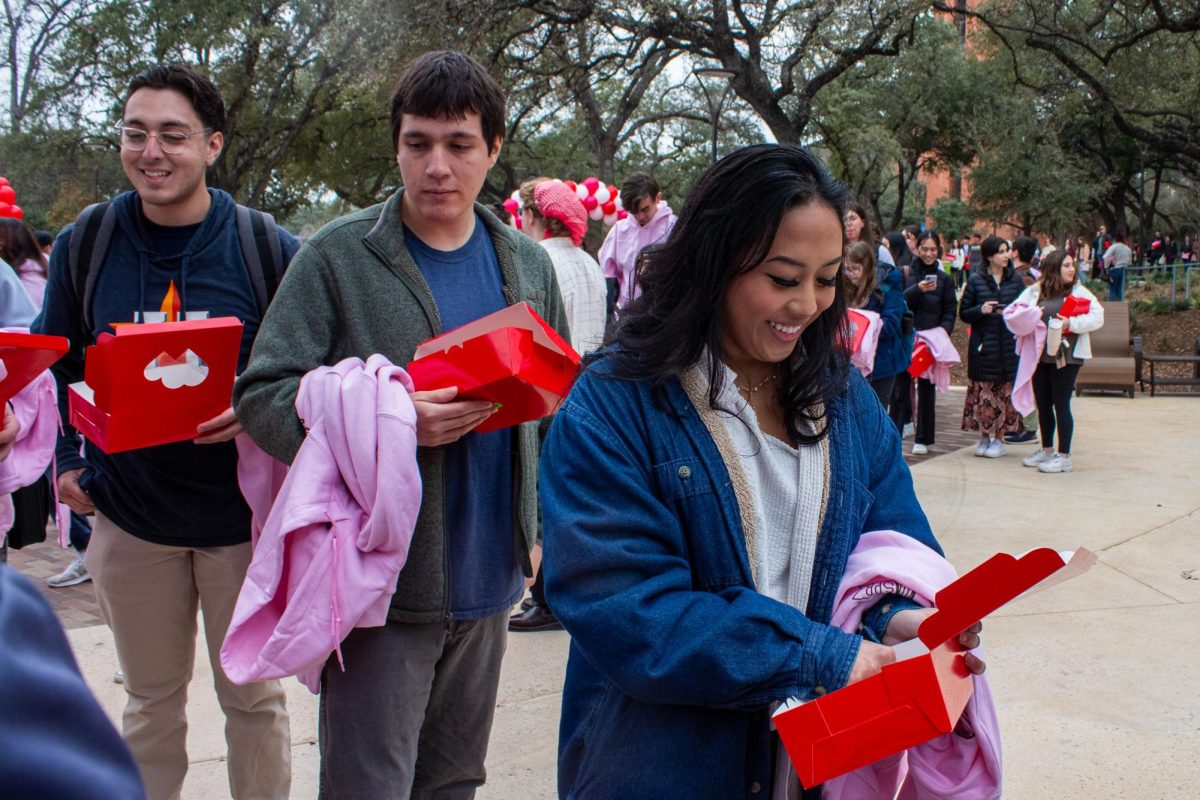Photo by Genevieve Humphreys
After pushback from student organizations regarding the adoption of the ACE memorandum to regulate student events, Student Involvement has started working directly with the Trinity community to draft new guidelines for protests on campus.
David Tuttle, dean of students, and Jamie Thompson, director of Student Involvement, brought ideas about new protest policies to the Jan. 30 Student Government Association (SGA) meeting. They discussed possible requirements for holding protests like registration, specific campus locations and restrictions on items, like signs or megaphones, as well as activities.
“If an organization or a group of students wants to protest or have a demonstration, what would that look like? Are there steps that would need to be followed? Maybe, but maybe not,” Thompson said in an interview. “So Dean Tuttle and I are working on the students side of things to get feedback, to hear from students, what resonates with them, what sits well with them, because ultimately, this is about things that would impact the living-learning community.”
Along with SGA, Tuttle and Thompson plan to reach out to other student organizations, including Trinity Progressives (T-Prog), Trinity Diversity Connection and Young Conservatives of Texas (YCT). Trinity staff and faculty will be consulted as well.
“Right now we’re really just in the exploratory phase, seeking feedback, getting ideas. What we’re exploring is do we need more information, more infrastructure, to help guide what speech and expression looks like on campus?” Thompson said. “The [Student Rights and Responsibilities statement] is a great foundation and says a lot about what Trinity’s expectations are around speech and expression. And I think that there’s probably some opportunity for us to have a document, some guidance, that helps operationalize speech and expression.”
There has been discussion about protest policies and free speech on campus since Bernie Sanders came to campus last spring. Policies were implemented around the arrival of Sanders without student input, and multiple student organizations petitioned for the university to roll back some of the policies.
“It used to be sufficient in simpler times to say students can have a right to expression and protest as long as it doesn’t disrupt the operations of the university. In recent years, especially with the advent of speakers, universities have realized they have to be prepared and it’s not enough to just say don’t be disruptive,” Tuttle said. “So I think, especially with the students and faculty, we need their buy-in so that when there’s implementation, then these policies are successfully implemented.”
Junior Isaiah Mitchell, president of Trinity’s YCT chapter, is concerned with students having too much say in policy-making.
“I, and probably a few other conservatives, are kind of conflicted about that kind of approach. On the one hand, I think the school can take a little too much feedback from students and incorporate them a little bit too much into rule-making processes,” Mitchell said. “But on the other hand, as the political minority on the campus, we’d always like to have a little bit of input in what the school is doing.”
Mitchell also holds reservations about what policies and restrictions would potentially look like.
“A lot of public campuses around the state have stringent speech codes that begin with these little seeds of things that are quite reasonable but kind of snowball into increasing strict rules. I hope that’s not what they’re implementing here,” Mitchell said.
The Student Rights and Responsibilities statement has subsections about expression and public expression, and according to Tuttle, the new policies would not want to diminish the right of expression, but he understands the possible dangers of free-range protests.
“This document is kind of a guiding document of the university in terms of we will not squelch people’s opportunities or abilities to express themselves. It’s an important value of higher education, that faculty and students are unencumbered in what they can say,” Tuttle said. “But if you don’t register something and if it’s a hot-button issue and there are concerns about what if this escalates into violence — the university wouldn’t want to be caught flat-footed and be like, ‘Well, we didn’t have a TUPD presence, and it turns out we needed that presence because of the volatility of the situation.’ It would behoove the university and most universities to not put impediments in place for students to [protest].”
Though the long process of protest registration may discourage students from protesting and expressing themselves, sophomore Carson Bolding, an SGA senator and vice president of T-Prog, understands that it’s important to require this registration.
“There’s definitely a balance you have to try and figure out how to strike, which is really hard because you don’t want to limit students’ abilities to protest, but you also want to make sure that students feel safe and protected on campus,” Bolding said. “Which is different than feeling comfortable, not everybody has to feel comfortable all the time, but people also shouldn’t feel in danger.”
In addition to protest policies, Tuttle and other faculty members are exploring the idea of putting in a statement about students’ right to exist at Trinity.
“[We want to explore having] some sort of statement that affirms peoples right to exist here, and that we’re guided by a value of civility to one another and by the important idea of freedom of speech. Whether it’s like the honor code or is a social contract, [it would] basically say that these things can coexist. There can be free speech and it can happen without undermining people’s sense of their identity and their freedom to exist here and thrive here. These things can coexist and if we can agree on that, then the policy kind of becomes secondary,” Tuttle said.
The group working on these new campus protest policies hopes to have them drafted by the end of this semester.














Anonymous Progressive • Feb 8, 2019 at 1:51 pm
Speaking as a progressive, I implore progressive student groups to reconsider their support for policies which limit the ability of students to protest. Today, the university’s administration is sympathetic to liberal/progressive positions and many students identify as liberal/progressive. But what about tomorrow? What if future versions of the Trinity administration are more hostile to liberal/progressive causes?
I do not agree with any of YCT’s substantive positions when it comes to other topics, but Mitchell makes an excellent point when he states, “A lot of public campuses around the state have stringent speech codes that begin with these little seeds of things that are quite reasonable but kind of snowball into increasing strict rules.”
Free speech should not be seen as an issue that pits conservatives vs. progressives, and it saddens me to see the left yielding this issue to the right. It should matter to every single one of us. If we impose regulations in an attempt to restrict conservative student groups those same regulations can be used to restrict liberal student groups. If you are a progressive, ask yourself this question, “How would these free speech regulations play out if members of Black Lives Matter wanted to hold a protest on campus?” If you are a conservative, ask yourself this question, “How would these free speech regulations play out if we wanted to bring Ryan Anderson back to campus?”
I understand why the administration is trying to draft these policies, but this should be the sort of thing that unifies students on the right and the left in support of free speech. We saw this happen 55 years ago during the Free Speech Movement. Young conservatives and young liberals joined together to stand up for everyone’s right to free speech. (Wikipedia has a great summary of this important moment in our nation’s history.)
I urge Trinity students on all sides of the spectrum to stand shoulder to shoulder in support of unregulated speech.